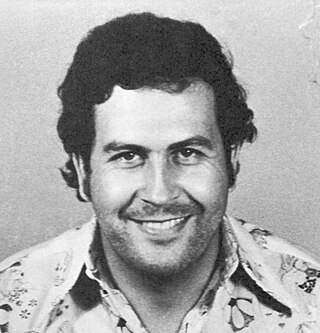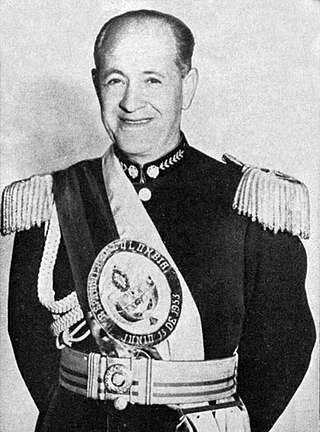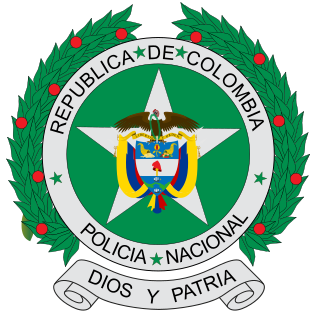Related Research Articles

The Revolutionary Armed Forces of Colombia – People's Army is a Marxist–Leninist guerrilla group involved in the continuing Colombian conflict starting in 1964. The FARC-EP was officially founded in 1966 from peasant self-defense groups formed from 1948 during the "Violencia" as a peasant force promoting a political line of agrarianism and anti-imperialism. They are known to employ a variety of military tactics, in addition to more unconventional methods, including terrorism.

Álvaro Uribe Vélez is a Colombian politician who served as the 31st President of Colombia from 7 August 2002 to 7 August 2010.

The United Self-Defenders of Colombia was a Colombian far-right paramilitary and drug trafficking group which was an active belligerent in the Colombian armed conflict during the period from 1997 to 2006. The AUC was responsible for retaliations against the FARC and ELN communist organization as well as numerous attacks against civilians beginning in 1997 with the Mapiripán massacre.

The Medellín Cartel was a powerful and highly organized Colombian drug cartel and terrorist organization originating in the city of Medellín, Colombia, that was founded and led by Pablo Escobar. It is often considered to be the first major "drug cartel" and was referred to as such; due to the organization's upper echelons and overall power-structure being built on a partnership between multiple Colombian traffickers operating alongside Escobar. Included were Jorge Luis Ochoa Vásquez, Fabio Ochoa Vásquez, Juan David Ochoa Vásquez, José Gonzalo Rodríguez Gacha and Carlos Lehder. Escobar's main partner in the organization however was his cousin Gustavo Gaviria who handled much of the cartel's shipping arrangements and the more general and detailed logistical aspects of the cocaine trafficking routes and international smuggling networks which were supplying at least 80% of the world's cocaine during its peak. Gustavo, also known as León seems to have also had a strong hand in the cartel's unprecedented acts of narcoterrorism, right alongside his cousin Pablo and was considered to be second in command of the cartel and therefore one of Colombia's most wanted men, with both him and Escobar having arrest warrants pending from other nations where their criminal activity had spread to, such as in Spain and the U.S. Meanwhile, Pablo Escobar's brother Roberto Escobar acted as the organization's accountant. The cartel operated from 1976 to 1993 in Colombia (Antioquia), Bolivia, Panama, Central America, Peru, the Bahamas, the United States, as well as in Canada.

Clement Blair Peach was a New Zealand teacher who was killed during an anti-racism demonstration in Southall, London, England. A campaigner and activist against the far right, in April 1979 Peach took part in an Anti-Nazi League demonstration in Southall against a National Front election meeting in the town hall and was hit on the head, probably by a member of the Special Patrol Group (SPG), a specialist unit within the Metropolitan Police Service. He died in hospital that night.

Ernesto Samper Pizano is a Colombian politician. Samper is a member of the influential Samper family. He served as the President of Colombia from 1994 to 1998, representing the Liberal Party. From 2014 to 2017 he served as the Secretary General of the Union of South American Nations (UNASUR).

Gustavo Rojas Pinilla was a Colombian army general, civil engineer and politician who ruled as 19th President of Colombia in a military dictatorship from June 1953 to May 1957.
Corps General Abelardo Colomé Ibarra was a Vice President of the Council of State of Cuba and the Cuban Minister of the Interior, serving in the latter position from 1989, until his retirement in October, 2015. Known as Furry he first laid the foundations of State Security in 1959.

Brigadier-General Sir William Thomas Francis Horwood, was a British Army officer who also served as Commissioner of Police of the Metropolis, head of London's Metropolitan Police, from 1920 to 1928.

The Polícia de Segurança PúblicaMHTE is the national civil police force of Portugal. Part of the Portuguese security forces, the mission of the PSP is to defend Republican democracy, safeguarding internal security and the rights of its citizens. Despite many other functions, the force is generally known for policing urban areas with uniformed police officers, while rural areas are normally policed by National Republican Guard (GNR), the country's national gendarmerie force. PSP is focused in preventive policing, only investigating minor crimes. Investigation of serious crimes falls under the Judicial Police responsibility, which is a separate agency.

Juan Almeida Bosque was a Cuban politician and one of the original commanders of the insurgent forces in the Cuban Revolution. After the rebels took power in 1959, he was a prominent figure in the Communist Party of Cuba. At the time of his death, he was a Vice-President of the Cuban Council of State and was its third ranking member. He received several decorations, and national and international awards, including the title of "Hero of the Republic of Cuba" and the Order of Máximo Gómez.

The National Police of Colombia is the national police force of the Republic of Colombia. Although the National Police is not part of the Military Forces of Colombia, it constitutes along with them the "Public Force" and is also controlled by the Ministry of Defense. The National Police is the only civilian police force in Colombia. The force's official functions are to protect the Colombian nation, enforce the law by constitutional mandate, maintain and guarantee the necessary conditions for public freedoms and rights and to ensure peaceful cohabitation among the population.
The Mapiripán massacre was a massacre of civilians that took place in Mapiripán, Meta Department, Colombia. The massacre was carried out from 15 to 20 07 1997, by the United Self-Defence Forces of Colombia (AUC), an outlawed right-wing paramilitary group.

The Colombian parapolitics scandal or "parapolítica" in Spanish refers to the 2006–present Colombian congressional scandal in which several congressmen and other politicians have been indicted for colluding with the United Self-Defense Forces of Colombia (AUC), a paramilitary group which is responsible for killing thousands of Colombian civilians.
Erneido Andres Oliva Gonzalez was a Cuban-American who was the deputy commander of Brigade 2506 land forces in the abortive Bay of Pigs Invasion of Cuba in April 1961.

Politics of Valledupar refers to the political processes in the Colombian city of Valledupar in Cesar Department. The local politics of Valledupar take places within the framework of the Politics of Colombia which are based on a presidential system and representative democratic republic.

The sixth Summit of the Americas was held at Cartagena, Colombia, on April 14–15, 2012. The central theme of the summit was "Connecting the Americas: Partners for Prosperity." The main issues at the summit's agenda was the exclusion of Cuba, the legalisation of drugs to fight the War on Drugs and Argentina's sovereignty claims over the Falkland Islands. Additionally, criticism of an expansionist monetary policy was also leveled on the developed economies. A final statement was not forthcoming over the issue of Cuba's inclusion in the next summit which was supported by all states except the United States and Canada. Panama was chosen to host the 7th Summit of the Americas.

Delfin C. Castro was a major general of the Armed Forces of the Philippines. He was the commander of the AFP Southern Command (SOUTHCOM), from 1981 to 1986. Notable incidents during his tenure include the Pata Island massacre, the assassination of Zamboanga City Mayor Cesar Climaco, the rescue of kidnapped Bishop Federico O. Escaler from Muslim rebels and the strafing of the Japanese vessel Hegg by Philippine Air Force fighters off Mindanao.

The "false positives" scandal was a series of murders in Colombia, part of the armed conflict in that country between the government and guerrilla forces of the FARC and the ELN. Members of the military had poor or mentally impaired civilians lured to remote parts of the country with offers of work, killed them, and presented them to authorities as guerrilleros killed in battle, in an effort to inflate body counts and receive promotions or other benefits. While Colombian investigative agencies find cases as early as 1988 the peak of the phenomenon took place between 2006 and 2009, during the presidency of Álvaro Uribe Vélez.
The following lists events that happened during 2007 in Colombia.